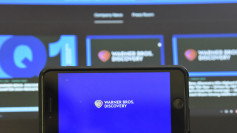The Food and Drug Administration (FDA) has approved a new Alzheimer's drug from Eli Lilly, adding another significant treatment option for this debilitating disease. The drug, donanemab, which will be marketed under the brand name Kisunla, is a monoclonal antibody infusion administered every four weeks. The approval, announced on Tuesday, comes after clinical trials demonstrated that Kisunla modestly slows the decline in memory and cognitive abilities in patients with mild cognitive impairment or early Alzheimer's disease.
Kisunla targets amyloid plaques in the brain, a hallmark of Alzheimer's disease. Dr. Ronald Petersen, a neurologist at the Mayo Clinic, emphasized the importance of this approval, stating, "It will give clinicians and patients a choice." The drug's approval follows last summer's full approval of a similar drug, Leqembi.
The approval of Kisunla is based on a late-stage clinical trial involving 1,700 participants, which showed that the drug slowed the progression of Alzheimer's by about 35% over 18 months compared to a placebo. This decline was measured using the clinical dementia rating scale, focusing on six categories: memory, orientation, judgment and problem-solving, community affairs, home and hobbies, and personal care. The results were comparable to those seen with Leqembi.
Eli Lilly has indicated that once a patient's amyloid levels reach very low levels, they may be able to stop the treatment. However, if amyloid levels rise again, the patient might need to restart the treatment. Kisunla, like other drugs in its class, comes with potentially life-threatening side effects, including brain swelling and bleeding. Although most cases identified in the trial were mild, three deaths were linked to the drug, according to the FDA.
The drug is expected to be priced at $32,000 for a 12-month supply, and Medicare is anticipated to cover the treatment. Last year, the Centers for Medicare and Medicaid Services stated that it would pay for new Alzheimer's drugs granted full FDA approval, though physicians will need to collect data on how well the drugs perform in the real world.
The FDA had initially planned to decide on the treatment in March but delayed the decision to get more guidance from its advisory panel on whether the benefits outweighed the side effects. Last month, the agency's committee of outside experts unanimously recommended the drug's approval.
Pat Bishara, a 79-year-old participant in both the phase 3 trial and the extension trial of Kisunla, shared her experience, saying she had no noticeable side effects during the trial. Diagnosed with mild cognitive impairment in late 2017, Bishara believes the treatment has helped her significantly. "I feel in my heart I wouldn't be doing as well as I'm doing if I wouldn't have been on something," she said.
Kisunla is the second Alzheimer's drug of its kind approved by the FDA, following Leqembi. A third drug, Biogen's Aduhelm, was taken off the market earlier this year.
Donanemab, Kisunla's active ingredient, helps remove amyloid plaque buildup in the brain, which is a key characteristic of Alzheimer's disease. While Kisunla is not a cure, clinical trials have shown that it can slow the progression of Alzheimer's, allowing people to live more independently for a longer period.
Eli Lilly's Anne White, executive vice president and president of Lilly Neuroscience, expressed the company's commitment to improving early detection and diagnosis of Alzheimer's disease. "Each year, more and more people are at risk for this disease, and we are determined to make life better for them," White said.
The Alzheimer's Association celebrated the approval of Kisunla. Dr. Joanne Pike, the group's president and CEO, stated, "This is real progress. Today's approval allows people more options and greater opportunity to have more time. Having multiple treatment options is the kind of advancement we've all been waiting for - all of us who have been touched, even blindsided, by this difficult and devastating disease."
With approximately 6.7 million Americans aged 65 and older living with Alzheimer's in 2023 and the number projected to increase to nearly 14 million by 2060, the need for effective treatments is critical. Kisunla's approval offers new hope for patients and their families, providing another tool in the fight against this relentless disease.






